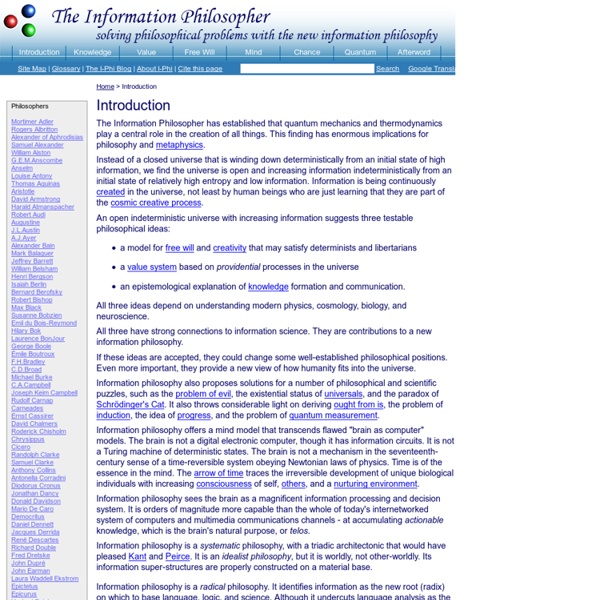Encore une fois sur la "Phénoménologie de l'esprit"
Je livre ci-dessous quelques remarques sur les passages numérotés 25 et 26 de la préface de la Phénoménologie de l'esprit . La "Phéno" a la réputation d'être un livre illisible tant sont grandes les difficultés de compréhension en certains passages. Les traductions les plus connues (Hyppolite, Lefebvre, Bourgeois) ont leurs méritent et leurs défauts et il faudrait sans doute lire les 3 versions - et sans doute aussi celles que je ne connais pas. Il faut dire quelques mots de l’organisation de cette préface et de ses objectifs. Venons-en à notre extrait. Les premiers mots sont déjà problématiques. « Que « le vrai soit effectif » … : il faut donc que le vrai soit effectif. Le vrai ne peut être effectif que comme système : voilà ce qui explicite l’effectivité du vrai. Qu’est-ce que c’est qu’un système ? a. b. c. La philosophie doit être systématique. La vraie figure dans laquelle existe la vérité ne peut être que le système scientifique de celle-ci. (5) Et un peu plus loin il précise :.
Philosophie, religion, science et conscience - Dieu, Platon, Darwin et l'avenir
spinoza.fr › Une lecture continue de l’Ethique de Spinoza
Alkemie - Revue semestrielle francophone de littérature et philosophie
N°106 - Le Silence
N° 106 - Hiver 2012 Thème : Le Silence Sommaire 3e millénaire : Un fil d'Ariane dans les pas du silenceViator : Le silence est une musiqueGangaji : La soumission du mental au silencePaul Pujol : Le silence et le chant de la vieNicole Montinéri : Le silence, espace de la rencontreVimala Thakar : Explorer la dimension du silenceJohn Martin Sahajananda : Le silence ou comment naître à la plénitudeJean-Marc Mantel : Etre silenceMonique Virelaude : La peur et son double : le silenceSerge Pastor : Le Veilleur SilencieuxDavid Ciussi : L'Impensable présence au milieu du silence créateurBetty : L'indéfinissable silencePeter Fenner : Silence naturel et impensabilité profondeDocument : Miguel Molinos : Les trois sortes de silencesRâmana Maharshi : L'enseignement du silenceRudolf Steiner : La voie du silenceApproches de la méditation : La voie de l'épochèTémoin d’éveil : David Anza : La clé de la vieLittérature et Spiritualité : J. N°106 - Fil d'ariane sur les pas du Silence - Hiver 2012 Le Silence
Pourquoi "Le Labyrinthe" ?
(J. D. Morrison) Au naturel la pensée papillonne, digresse, saute du coq à l'âne, revient sur ses pas, piétine, chahute, entrevoit l'avenir et se remémore le passé dans un même magma actuel (actuel, non pas présent), s'emmêle, se retrouve, s'attarde à une anecdote ou un bon mot, paît en estives, s'élance tout à coup comme l'éclair, dans une succession baroque de ralentis et d'accélérés, se plaît à telle (m/n)otion jusqu'à la délectation sans bien savoir au juste pourquoi celle-ci plutôt qu'une autre qu'elle esquive, ce jour-ci plus que de coutume. Sa structure ordinaire : la ramification "fractale", cette forme paradoxale infinie se déployant in concreto à l'intérieur d'un espace fini ; ainsi le pourtour d'une feuille de fougère, la multitude d'alvéoles pulmonaires, la barrière de corail, l'éponge. La réflexion revient des conclusions ainsi atteintes en rêvassant, au hasard de ces méandres (ou aux méandres du hasard). La droite raison sort d'une épreuve de forge.
Métaphysique, ontologie, esprit | François LOTH
Expositions à voir.
Gustave Doré (1832-1883). L'imaginaire au pouvoir Gustave Doré est sans doute l'un des plus prodigieux artistes du XIXe siècle. A quinze ans à peine, il entame une carrière de caricaturiste puis d'illustrateur professionnel - qui lui vaudra une célébrité internationale - avant d'embrasser tous les domaines de la création : dessin, peinture, aquarelle, gravure, sculpture. L'immense talent de Doré s'investit aussi dans les différents genres, de la satire à l'histoire, livrant tour à tour des tableaux gigantesques et des toiles plus intimes, des aquarelles flamboyantes, des lavis virtuoses, des plumes incisives, des gravures, des illustrations fantasques, ou encore des sculptures baroques, cocasses, monumentales, énigmatiques... En tant qu'illustrateur, Doré s'est mesuré aux plus grands textes (La Bible, Dante, Rabelais, Perrault, Cervantes, Milton, Shakespeare, Hugo, Balzac, Poe), faisant de lui un véritable passeur de la culture européenne. 18 février - 11 mai 2014
Le rasoir philosophique
Pascal Sévérac : Spinoza. Union et désunion.
Le livre de Pascal Sévérac, Spinoza. Union et désunion [1] propose une lecture d’ensemble du philosophe de l’Ethique. Le sens de l’éthique est de réaliser ces unions qui accroissent la puissance de l’homme : « toute la philosophie de Spinoza peut en effet être lue à travers cette question centrale : comment, étant donné notre situation au monde, modifier notre rapport à nous-mêmes, et aux autres, de telle sorte que nous puissions être plus fermes, plus forts, plus heureux ? » [2]. L’auteur montre comment la philosophie de Spinoza peut être lue comme une recherche de l’union avec le Dieu-Nature ; il spécifie les différentes modalités de cette union et montre en quel sens cette recherche constitue une voie de salut pour l’homme : « la question éthique de la philosophie spinoziste devient ainsi celle de l’union : celle de savoir à quoi et comment nous devons nous unir pour nous sauver. Puissance de la substance, faiblesse des modes L’être de l’union Rapports entre existence et éternité P. P.



